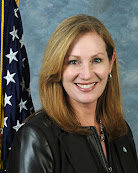 |
| Centers for Disease Control and Prevention illustration |
Kentucky Health News
In the final days of the 2022 legislative session, three bills to address Kentucky's healthcare workforce shortages are moving. One addresses the nursing shortage directly, one works toward recruitment and retention more broadly, and one addresses Medicaid payments for community health workers.
Senate Bill 10 addresses the nursing shortage with both short-term and long-term solutions, Rep. Kim Moser, R-Taylor Mill, said in presenting the bill to the House Wednesday, March 23.
Moser said the key components of SB 10 would streamline the process for out-of-state and foreign trained nurses to practice in Kentucky without compromising the standards of care; would improve access to nursing education by removing "arbitrary" enrollment limits without compromising the quality of the programs; and add term limits and geographic requirements for the Board of Nursing.
The Kentucky Nurses Association says Kentucky will need as many as 16,000 more nurses by 2024.
 |
| Rep. Kim Moser |
SB 10, sponsored by Sen. Robbie Mills, R-Henderson and Senate President Robert Stivers, R-Manchester, passed out the House 93-1. It awaits Senate concurrence with some minor changes related to the nursing board.
Another bill, sponsored by Moser, would impact the health-care workforce more broadly by establishing a Healthcare Worker Loan Relief Program for qualifying health-care workers.
"House Bill 573 establishes a much needed recruitment and retention tool for addressing healthcare worker shortage, especially in rural and underserved areas of Kentucky," Moser said in presenting the bill to the House March 23. "It provides financial incentives to attract and retain health-care providers."
The loan program would be aligned with the Kentucky State Loan Repayment Program and administered by the University of Kentucky's Center of Excellence in Rural Health.
The program would be set up as a trust fund in the state treasury that would consist of state general fund appropriations, gifts and grants from public and private sources and federal funds.
Moser said this program would supplement federal funding, which requires a state match for scholarships and loan forgiveness; would expand the list of health-care workers eligible to participate; and require recipients to work in under-served areas of Kentucky.The bill's House committee substitute calls for the loan relied fund to get $2 million a year, and adds ophthalmologists, optometrists and audiologist to the list of eligible recipients.
The House passed HB 573 91-3, but at week's end, it had not received any of its three required readings in the Senate or been assigned to a committee.
Moser's HB 525, which would allow Medicaid to pay certified community health workers, passed the Senate on its March 25 consent calendar and is back to the House for concurrence with Senate changes.
CHWs aren't trained medically, but are trained as patient advocates who come from the communities they serve. They help their clients coordinate care, provide access to medical, social and environmental services, work to improve health literacy, and deliver education on prevention and disease self-management.HB 525 would require the state Department for Medicaid Services to seek federal approval for a state plan amendment, waiver or alternative payment model, including public-private partnerships, for services delivered by certified CHWs. It would also streamline their certification process.
from KENTUCKY HEALTH NEWS https://ift.tt/4VW96cE Legislature moving bills to address health-care worker shortageHealthy Care
0 Response to "Legislature moving bills to address health-care worker shortageHealthy Care"
Post a Comment